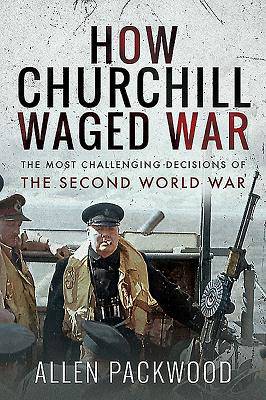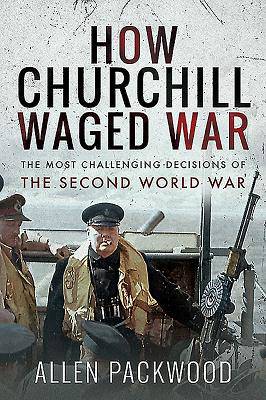
- Retrait gratuit dans votre magasin Club
- 7.000.000 titres dans notre catalogue
- Payer en toute sécurité
- Toujours un magasin près de chez vous
- Retrait gratuit dans votre magasin Club
- 7.000.000 titres dans notre catalogue
- Payer en toute sécurité
- Toujours un magasin près de chez vous
How Churchill Waged War
The Most Challenging Decisions of the Second World War
Allen Packwood
Livre broché | Anglais
20,95 €
+ 41 points
Format
Description
When Winston Churchill accepted the position of Prime Minister in May 1940, he insisted in also becoming Minister of Defence. He was not going to play the chairman's role, adjudicating between the competing claims of the ministers below him. He was going to get his hands dirty and take direct personal control of the day to day running of military policy. This, though, meant that he alone would be responsible for the success or failure of Britain's war effort. It also meant that he would be faced with many monumental challenges and utterly crucial decisions upon which the fate of Britain and the free world rested.
One of his first agonizing decisions was how to respond to the collapse of France, and the danger posed to Britain's survival should the powerful French fleet fall into German hands. When he ordered Admiral Sommerville to sink the French fleet at Mers-el-Kébir, he knew that France might be turned against Britain, but that act demonstrated to the world that he was determined to wage war 'whatever the cost may be'.
With the limited resources available to the UK, Churchill had to decided where his country's priorities lay. Should he concentrate on the defense of the realm or take the war to the enemy - and where should any offensive action be focused? Did Egypt and the war in North Africa take precedence over Singapore and the UK's empire in the East? How much support should be offered to the Soviet Union? How much of the direction of the war could he allow to be dictated by the United States?
In this insightful investigation into Churchill's conduct during the Second World War, Allen Packwood, the Director of the Churchill Archives Centre, enables the reader to share the agonies and uncertainties faced by Churchill at each crucial stage of the war. How Churchill responded to each challenge is analyzed in great detail and the conclusions the author draws are as uncompromising as those made by Britain's wartime leader as he negotiated his country through its darkest days.
One of his first agonizing decisions was how to respond to the collapse of France, and the danger posed to Britain's survival should the powerful French fleet fall into German hands. When he ordered Admiral Sommerville to sink the French fleet at Mers-el-Kébir, he knew that France might be turned against Britain, but that act demonstrated to the world that he was determined to wage war 'whatever the cost may be'.
With the limited resources available to the UK, Churchill had to decided where his country's priorities lay. Should he concentrate on the defense of the realm or take the war to the enemy - and where should any offensive action be focused? Did Egypt and the war in North Africa take precedence over Singapore and the UK's empire in the East? How much support should be offered to the Soviet Union? How much of the direction of the war could he allow to be dictated by the United States?
In this insightful investigation into Churchill's conduct during the Second World War, Allen Packwood, the Director of the Churchill Archives Centre, enables the reader to share the agonies and uncertainties faced by Churchill at each crucial stage of the war. How Churchill responded to each challenge is analyzed in great detail and the conclusions the author draws are as uncompromising as those made by Britain's wartime leader as he negotiated his country through its darkest days.
Spécifications
Parties prenantes
- Auteur(s) :
- Editeur:
Contenu
- Nombre de pages :
- 288
- Langue:
- Anglais
Caractéristiques
- EAN:
- 9781526771094
- Date de parution :
- 29-08-19
- Format:
- Livre broché
- Format numérique:
- Trade paperback (VS)
- Dimensions :
- 155 mm x 231 mm
- Poids :
- 453 g







